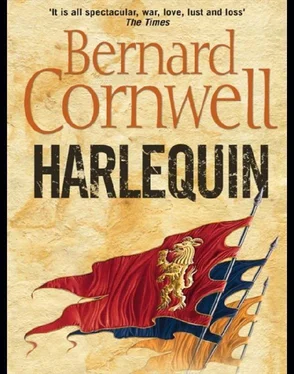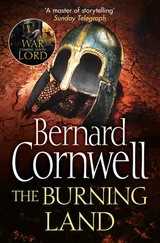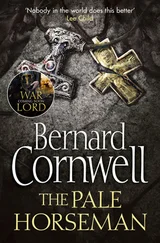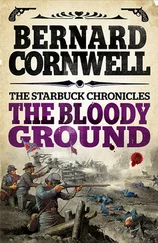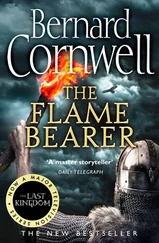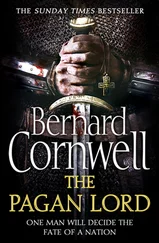He felt a heartbeat of pure terror. There was no escape and the French were coming. Then, almost without thinking, he put his right hand under the horn tip of the bow and launched it high over the English men-at-arms so it would fall behind them. The bow was an encumbrance now, so he would be rid of it, and he picked up a fallen shield, hoping to God it showed an English insignia, and pushed his left forearm into the tight loops. He drew his sword and stepped back between two of the lances held by the men-at-arms. Other archers were doing the same.
Let the archers in!“ the Earl of Northampton shouted. Let them in!” But the men-at-arms were too fearful of the rapidly approaching French to open their files.
Ready!“ a man shouted. Ready!” There was a note of hysteria in his voice. The French horsemen, now that the arrows were exhausted, were streaming up the slope between the corpses and the pits. Their lances were lowered and their spurs raked back as they demanded a last spurt from the horses before they struck the enemy. The trappers were flecked with mud and hung with arrows. Thomas watched a lance, held the unfamiliar shield high and thought how monstrous the enemy's steel faces looked. You'll be all right, lad." A quiet voice spoke behind him. Hold the shield high and go for the horse.
Thomas snatched a look and saw it was the grey-haired Reginald Cobham, the old champion himself, standing in the front rank. Brace yourselves!" Cobham shouted.
The horses were on top of them, vast and high, lances reaching, the noise of the hooves and the rattle of mail overwhelming. Frenchmen were shouting victory as they leaned into the lunge. Now kill them!" Cobham shouted.
The lances struck the shields and Thomas was hurled back and a hoof thumped his shoulder, but a man behind pushed him upright so he was forced hard against the enemy horse. He had no room to use the sword and the shield was crushed against his side. There was the stench of horse sweat and blood in his nostrils. Something struck his helmet, making his skull ring and vision darken, then miraculously the pressure was gone and he glimpsed a patch of daylight and staggered into it, swinging the sword to where he thought the enemy was. Shield up!“ a voice screamed and he instinctively obeyed, only to have the shield battered down, but his dazed vision was sharpening and he could see a bright-coloured trapper and a mailed foot in a big leather stirrup close to his left. He rammed his sword through the trapper and into the horse's guts and the beast twisted away. Thomas was dragged along by the trapped blade, but managed to give it a violent tug that jerked it free so sharply that its recoil struck an English shield. The charge had not broken the line, but had broken against it like a sea wave striking a cliff. The horses recoiled and the English men-at-arms advanced to hack at the horsemen who were relin-quishing lances to draw their swords. Thomas was pushed aside by the men-at-arms. He was panting, dazed and sweat-blinded. His head was a blur of pain. An archer was lying dead in front of him, head crushed by a hoof. Why had the man no helmet? Then the men-at-arms were reeling back as more horsemen filed through the dead to thicken the fight, all of them pushing towards the Prince of Wales's high banner. Thomas banged his shield hard into a horse's face, felt a glancing blow on his sword and skewered the blade down the horse's flank. The rider was fighting a man on the other side of his horse and Thomas saw a small gap between the saddle's high pommel and the man's mail skirt, and he shoved the sword up into the Frenchman's belly, heard the man's angry roar turn into a shriek, then saw the horse was falling towards him. He scrambled clear, pushing a man out of his path before the horse col-lapsed in a crash of armour and beating hooves. English men-at-arms swarmed over the dying beast, going to meet the next enemy. A horse with an iron garro deep in its haunch was rearing and striking with its hooves. Another horse tried to bite Thomas and he struck it with the shield, then flailed at its rider with his sword, but the man wheeled away and Thomas looked desperately for the next enemy. No prisoners!” the Earl screamed, seeing a man trying to lead a Frenchman out of the melee. The Earl had discarded his shield and was wielding his sword with both hands, hacking it like a wood-man's axe and daring any Frenchman to come and challenge him. They dared. More and more horsemen pushed into the horror; there seemed no end of them. The sky was bright with flags and streaked with steel, the grass was gouged by iron and slick with blood. A Frenchman rammed the bottom edge of his shield down onto an Englishman's helmet, wheeled the horse, lunged a sword into an archer's back, wheeled again and struck down at the man still dazed by the shield blow. Montjoie Saint Den is!“ he shouted. Saint George!” The Earl of Northampton, visor up and face streaked with blood, rammed his sword through a gap in a chanfron to take a horse's eye. The beast reared and its rider fell to be trampled by a horse behind. The Earl looked for the Prince and could not see him, then could not search more, for a fresh conroi with white crosses on black shields was forging through the melee, pushing friend and foe alike from their path as they carried their lances towards the Prince's standard.
Thomas saw a baffled lance coming at him and he threw himself to the ground where he curled into a ball and let the heavy horses crash by.
Montjoie Saint Denis!" the voices yelled above him as the Count of Astarac's conroi struck home.
Sir Guillaume d'Evecque had seen nothing like it. He hoped he never saw it again. He saw a great army breaking itself against a line of men on foot.
It was true that the battle was not lost and Sir Guillaume had convinced himself it could yet be won, but he was also aware of an unnatural sluggishness in himself. He liked war. He loved the release of battle, he relished imposing his will on an enemy and he had ever profited from combat, yet he suddenly knew he did not want to charge up the hill. There was a doom in this place, and he pushed that thought away and kicked his spurs back. Montjoie Saint Den is!" he shouted, but knew he was just pretending the enthusi-asm. No one else in the charge seemed afflicted by doubts. The knights were beginning to jostle each other as they strove to aim their lances at the English line. Very few arrows were flying now, and none at all were coming from the chaos ahead where the Prince of Wales's banner flew so high. Horsemen were now charging home all along the line, hacking at the English ranks with swords and axe, but more and more men were angling across the slope to join the fury on the English right. It was there, Sir Guillaume told him-self, that the battle would be won and the English broken. It would be hard work, of course, and bloody work, hacking through the prince's troops, but once the French horsemen were in the rear of the English line it would collapse like rotted wood, and no amount of reinforcements from the top of the hill could stop that panicked rout. So fight, he told himself, fight, but there was still the nagging fear that he was riding into disaster. He had never felt anything like it and he hated it, cursing himself for being a coward!
A dismounted French knight, his helmet's face-piece torn away and blood dripping from a hand holding a broken sword, while his other hand gripped the remnants of a shield that had been split into two, staggered down the hill, then dropped to his knees and vomited. A riderless horse, stirrups flapping, galloped white-eyed across the line of the charge with its torn trapper trailing in the grass. The turf here was flecked by the white feathers of fallen arrows that looked like a field of flowers.
Go! Go! Go!" Sir Guillaume shouted at his men, and knew he was shouting at himself. He would never tell men to go on a battle-field, but to come, to follow, and he cursed himself for using the word and stared ahead, looking for a victim for his lance, and he watched for the pits and tried to ignore the melee that was just to his right. He planned to widen the melee by boring into the English line where it was still lightly engaged. Die a hero, he told himself carry the damned lance right up the hill and let no man ever say that Sir Guillaume d'Evecque was a coward.
Читать дальше
Конец ознакомительного отрывка
Купить книгу
